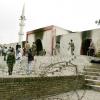India, Bangladesh: Joint Task Force for Countering Militancy
The Government of Bangladesh has recently accepted India’s proposal to set up a Joint Task Force to deal with militancy and other anti-national elements. However, modalities of the Task Force are yet to be decided. As of now, India will be assisting Bangladesh with intelligence inputs only without any direct involvement in any joint military operations to flush out militants taking shelter in Bangladesh.







